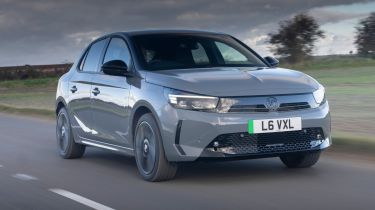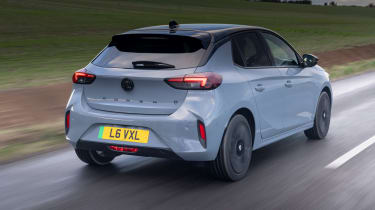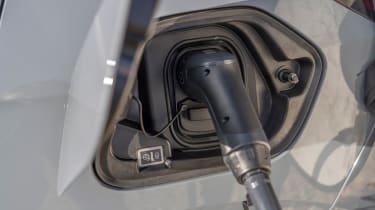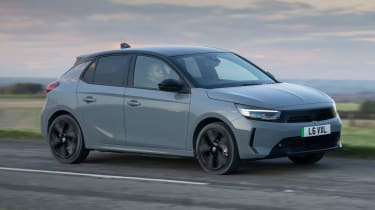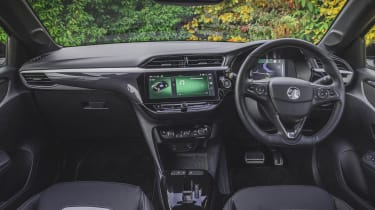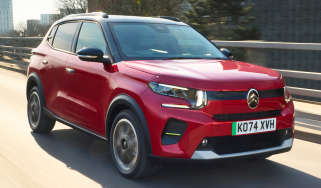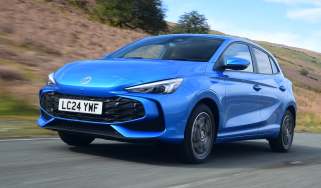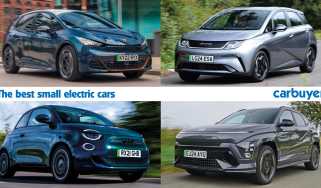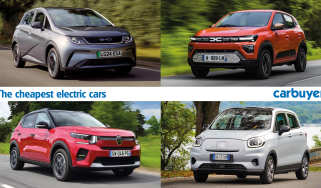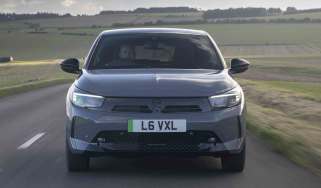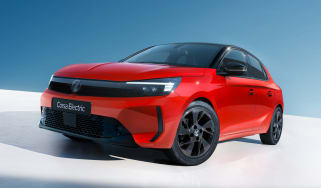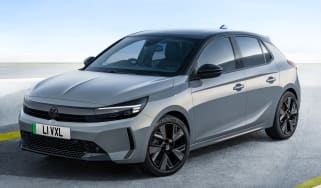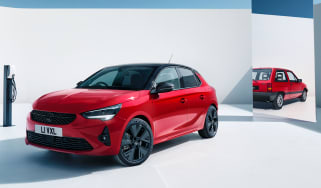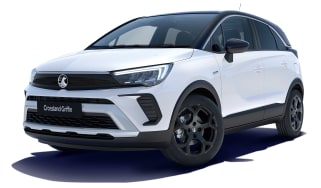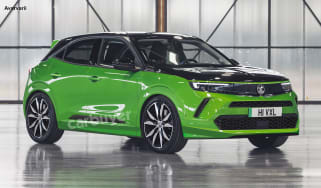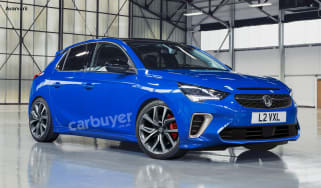Vauxhall Corsa Electric review - cheap to run, but expensive to buy
"A useful range and huge dealer network add to the appeal of the Vauxhall Corsa Electric, but several electric rivals feel more special"
Pros
- Cheap to run
- Fast charging
- Good to drive
Cons
- Underwhelming interior
- Choppy ride
- Expensive to buy or lease
Verdict - Is the Vauxhall Corsa Electric a good car?
The Vauxhall Corsa Electric is an accomplished entry into the EV market but it's a shame Vauxhall – a brand known for its value – couldn't make it less expensive. Even the closely related Peugeot E-208 feels more upmarket, and buyers can choose the stylish Honda e or sporty MINI Electric for around the same price, along with bigger EVs like the MG4 and Nissan Leaf.
Vauxhall Corsa Electric models, specs and alternatives
Buyers looking for a familiar badge on their first electric car will love the Vauxhall Corsa Electric. Previously called the Vauxhall Corsa-e until a range-wide name change in 2022, the British marque is hoping the plug-in supermini will become a long-term staple of the lineup, rather than a quick fix to the growing demand for electrification.
From its inception, the latest Corsa was designed to accommodate both combustion engines and an electric powertrain without major sacrifices in any area. Due to Vauxhall’s recent change of ownership, the Corsa Electric is actually based on the same building blocks as the Peugeot E-208.
 The 10 best electric cars in 2025
The 10 best electric cars in 2025
The Corsa Electric has the same 50kWh battery pack and potent 134bhp electric motor, giving it a range of up to 222 miles. A 2023 facelift of the car brought a new look and upgraded infotainment tech, along with a second powertrain option utilising an even more potent 154bhp motor and a 51kWh battery for a range of up to 246 miles.
More reviews
Both can accept rapid charging of up to 100kW, which will top up the battery pack to 80% in 30 minutes when you need to add range quickly. The suspension is stiffer to compensate for the extra weight of the batteries, and while the ride is slightly choppy as a result, the Corsa-e also feels planted and precise on a twisting road.
Sit inside, and the Corsa Electric is virtually identical to the conventional petrol models. Every electric Corsa is well equipped, with alloy wheels, LED headlights, climate control, lane departure warning and a touchscreen infotainment system as standard. The quality of the design and materials doesn't quite match up to the electric Corsa's price tag, though, with rivals like the Honda e and MINI Electric feeling more special inside.
A clean-sheet design means interior space is less compromised in the Corsa than in earlier electric models, which often had batteries crammed under the back seats and boot floor. Passenger room is as good as you'd expect for a five-door supermini, and the boot is a decent size, too.
Range, charging & running costs
Earlier versions of the Corsa-e or Corsa Electric (the name was changed to the latter in 2022) have a battery capacity of 50kWh (total capacity). This can propel the electric Corsa for up to 222 miles, according to Vauxhall, but a range of 150-170 miles is more likely in normal conditions, particularly when larger alloy wheels are fitted. This is on a par with the Peugeot E-208 (with an identical battery and motor) and quite a bit more than the Honda e (137 miles) and MINI Electric (145 miles), but the Renault ZOE trumps them all with a 245-mile range. The Vauxhall's official range was improved slightly (up from 209 miles) in late 2021, thanks to optimisation of the car's heating system, transmission and low rolling resistance tyres.
A facelift in 2023 brought a second drivetrain option. This upped the electric motor’s power by 20bhp to 154bhp, and increased the battery capacity to 51kWh. This hiked the maximum range up to 246 miles.
The older electric motor and battery setup meant that, while the Corsa Electric felt economical around town and in lower-speed environments, its range was heavily affected at motorway speeds. Since the introduction of the 51kWh battery and 154bhp motor system, things appear to have improved, and we found the latest Corsa Electric came close to achieving its official range figures.
Both versions of the Corsa Electric can be charged at up to 100kW using public rapid-charging stations, with a 15-80% top-up taking around 26 minutes. A 7.4kW 'Mode 3' cable comes as standard, along with a 2.3kW cable for charging from a three-pin socket. Using a 7.4kW wallbox, an overnight charge takes around 7.5 hours.
Ongoing running costs should be much lower than for a petrol or diesel supermini, but the Corsa Electric will be more expensive to lease – unless you get one of the good deals that come up from time to time.
When you compare finance deals with rivals, it’s hard for the Corsa to compete with models like the MG4, but even larger, more practical cars like the Renault Megane E-Tech and Volkswagen ID.3 offer compelling finance arrangements, and it’s a shame Vauxhall can’t shave off some of the cost to compete.
The Corsa Electric is exempt from VED (road tax) until 2025, but it's business drivers who could stand to gain the most because Benefit-in-Kind (BiK) is a mere fraction of what you'd pay on a petrol or diesel Corsa. Insurance may be more costly because the Corsa Electric sits in groups 24-25, while even the top petrol Corsa is only in group 17.
The Corsa Electric needs servicing after one year or 8,000 miles, then at two years or 16,000 miles, but after that it only needs servicing every other year.
It’s worth noting that the Corsa Electric suffers from quite severe depreciation, which makes it a little less appealing as a new car. Used examples from early 2020 can be found for around £10,000 at the time of writing, meaning they’ve lost a significant chunk of value from their original list price of over £30,000.
Electric motor, drive & performance
With 134bhp and 260Nm of torque, the electric motor in the entry-level Corsa Electric certainly looks good on paper, boasting ‘warm hatch’ levels of power. It does have a bit more work to do, though, because the electric Corsa weighs around 350kg more than the petrol model. Still, early versions of the Corsa Electric got from 0-62mph in a brisk 7.6 seconds and a 93mph top speed meant motorway journeys were no problem, although the acceleration available does tend to tail off a bit as you go faster. However, getting from 0-30mph is particularly swift, making the Corsa Electric feel very sprightly when pulling away from junctions and traffic lights.
During the 2023 facelift, the performance of this version was actually dialled back a wee bit, the 0-62mph dash being extended to 8.9 seconds. A higher-powered variant was also added, which ups the power output by 20bhp to 154bhp in total, with a 0-62mph time of 8.2 seconds.
We’ve now driven the 154bhp variant on UK roads, and on first impression, you might be hard-pressed to notice much of a difference in the way the Corsa feels to drive compared to the lower-powered setup. In the default driving mode, Vauxhall has limited the Corsa’s power in a bid to improve real-world range, and the throttle response is dulled which can make the car feel rather numb.
Put the Corsa Electric into Sport mode, however, and its full power is unlocked, making the difference more apparent. It feels eager and zippy, making it feel better suited to overtaking and accelerating on A-roads and motorways.
The low-slung battery means the electric Corsa’s extra weight is low to the ground; in fact, the Corsa Electric has a centre of gravity six centimetres lower than conventionally powered versions. The suspension has been stiffened up, too, and as a result the Corsa Electric proves engaging through a set of bends, with accurate if somewhat lifeless steering. If we’re honest, though, it still doesn’t feel quite as agile as the petrol-powered Corsa.
The stiffer suspension does mean that the Corsa Electric’s ride is slightly lumpier than the standard model’s, with the car fidgeting over scruffy surfaces. We’d recommend selecting the version with the smallest wheels available to make the ride a bit more forgiving.
Interior & comfort
Like the Peugeot E-208, the Corsa Electric hasn't been designed to shout about its electric powertrain. Instead, Vauxhall simply wants customers to choose petrol, diesel or electric based on what suits their needs best. This is reflected inside, where you'll find an interior virtually identical to the standard Corsa, although there’s now a toggle-style selector instead of a normal gearlever. Although the electric model was originally only available in the two higher trim levels, buyers can now have the Corsa Electric in all three: Design, GS and Ultimate.
Design trim comes only with the older 134bhp powertrain and gets LED lighting, cruise control, remote locking, 16-inch alloy wheels and an infotainment system with DAB radio, Apple CarPlay, Android Auto and a seven-inch touchscreen. GS trim adds front parking sensors, a reversing camera, keyless entry and go, 17-inch wheels, some exterior styling enhancements and an upgraded infotainment system with a 10-inch touchscreen, sat-nav, wireless Apple CarPlay and Android Auto (which is much better integrated thanks to the bigger screen, by the way, which is important as the native system can be rather laggy and slow to respond to inputs) and a wireless phone charger.
Ultimate trim brings clever Matrix LED headlights, adaptive cruise control, heated front seats, a heated steering wheel, Alcantara seat upholstery, and a massaging driver’s seat. It’s worth remembering that, right now, Design trim is only available with the more basic 50kWh powertrain, Ultimate trim is only available with the more advanced 51kWh powertrain, while GS trim can be had with either.
The main issue with the Corsa's interior is that it just feels rather ordinary given how much the all-electric version costs. The Honda e and MINI Electric boast far more character inside and have a more upmarket feel, while even the closely related e-208 and latest Renault ZOE outdo the Vauxhall for quality.
Practicality & boot space
It may have been designed to accommodate an electric powertrain from the outset but the Corsa Electric doesn't get away without losing any practicality. Compared with the petrol Corsa, boot space drops from 309 to 267 litres. The usable room on offer is the same, but, there's no hidden storage if you flip up the boot floor, and importantly, no logical place to store charging cables. There's more luggage space than a MINI Electric but a ZOE has a 338-litre boot.
Passenger space is fine, with more headroom than the MINI and little difference from a regular Corsa model. There are still decent-sized door bins and a storage cubby between the front seats for personal items. An electric handbrake and small gear selector also means there are two large cupholders and a tray for your smartphone.
Reliability & safety
The plug-in Corsa is fitted with the latest safety technology, including blind-spot alerts, lane-keeping assist, autonomous emergency braking (AEB), traffic-sign recognition and a rear-view camera. It received a four-star safety rating from Euro NCAP – the same as the Peugeot 208, but behind the Renault Clio, which scored the full five stars.
It's early days for reliability, but we'd argue that if you're considering a Corsa, the electric version should give the least cause for concern. Electric motors have far fewer moving parts than combustion engines; there's no oil, timing chains or clutch to worry about, and energy harvesting recuperation also makes life easier for the brakes. Executives from Vauxhall's parent company will also be aiming to improve the brand's reputation. Vauxhall finished 24th out of 32 brands in our 2023 Driver Power survey. Almost a quarter of owners of the brand’s cars reported a fault of some kind in our survey, with electrical issues being the biggest source of trouble.
